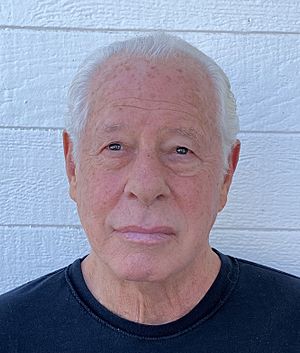Stephen Yagman facts for kids
Quick facts for kids
Stephen Yagman
|
|
|---|---|
 |
|
| Born | December 19, 1944 |
| Education | Long Island University (BA) Fordham University School of Law (JD) |
| Known for | Federal Civil Rights; Constitutional Law |
Stephen Yagman (born December 19, 1944) is an American lawyer who works on federal civil rights cases. This means he helps people protect their rights when they feel the government has treated them unfairly. He is known for being a very strong and dedicated lawyer, especially in cases where people claim they were treated badly by the police. He has worked on many federal civil rights cases and has been involved in over 150 appeals, even asking the United States Supreme Court to hear some of his cases.
Contents
Who is Stephen Yagman?
Stephen Yagman was born on December 19, 1944, in Brighton Beach, a part of Brooklyn, New York. His parents worked hard; his father was a dental mechanic, and his mother was a secretary.
Early Life and Education
Yagman went to Abraham Lincoln High School. After attending the State University of New York at Buffalo, he graduated from Long Island University in Brooklyn. He earned a Bachelor of Arts (BA) degree in American History, also studying philosophy and political science.
Later, he earned a Master of Arts (MA) degree in philosophy from New York University. While studying, his main teacher was Professor Sidney Hook. His master's paper was about the Fifth Amendment, which protects people from having to testify against themselves. He then went to Fordham University School of Law and earned his law degree (Juris Doctor, or JD) in 1974. During his time in graduate school and law school, from 1967 to 1974, he taught various subjects like English and social studies in public schools in Harlem and Bedford Stuyvesant, New York City. These were schools in areas with less money.
A Career in Law
Yagman's legal career started even before he finished law school. He worked as an attorney-intern with the New York City Legal Aid Society, which helps people who cannot afford a lawyer. After graduating from law school, he was appointed as a Special Assistant Attorney General for New York State. In this role, he worked as a special prosecutor investigating nursing homes.
Fighting for Rights
Stephen Yagman has a strong reputation for helping people who have been treated unfairly by the police. He has represented many people in cases against the Los Angeles Police Department and the Los Angeles County Sheriff's Department.
In 1986, Yagman successfully challenged a plan to stop federal jury trials across the country because of money problems. A judge praised Yagman, saying his dedication to protecting his clients' rights helped everyone. The judge noted Yagman's "fortitude and tenacity" (courage and determination) in helping his civil rights clients.
Important Court Cases
In 2002, Yagman brought one of the first cases to help people held at Guantanamo Bay. He argued that these detainees should be able to ask U.S. courts to decide if they were being held legally. In 2003, he won an important case that said people held at Guantanamo could indeed seek help from United States courts.
In 1997, Yagman was sworn in as a Special Prosecutor for the State of Idaho. He was tasked with prosecuting an FBI sniper involved in a shooting incident in 1992. In 2001, Yagman won a court decision that said federal law enforcement agents could be prosecuted for crimes under state law, meaning they were not completely protected from being sued.
Yagman also made complaints about how some judges handled cases. His actions helped lead to new rules in 2008 for how complaints against federal judges are handled across the country. A law professor described Yagman as a "highly competent, dedicated lawyer who is a champion of unpopular causes."
He has taken over 200 federal civil rights cases to a jury verdict and has argued more than 150 appeals, including requests to the United States Supreme Court.
Teaching and Writing
Stephen Yagman has also shared his knowledge by teaching. In 2007, he taught courses at UCLA School of Law on topics like law, fairness, and social justice, as well as police misconduct.
He has written two national legal books for lawyers: Section 1983 Federal Jury Practice and Instructions and Police Misconduct and Civil Rights, Federal Jury Practice and Instructions. He also wrote a play called Guantanamo, Act IV and many newspaper columns.

